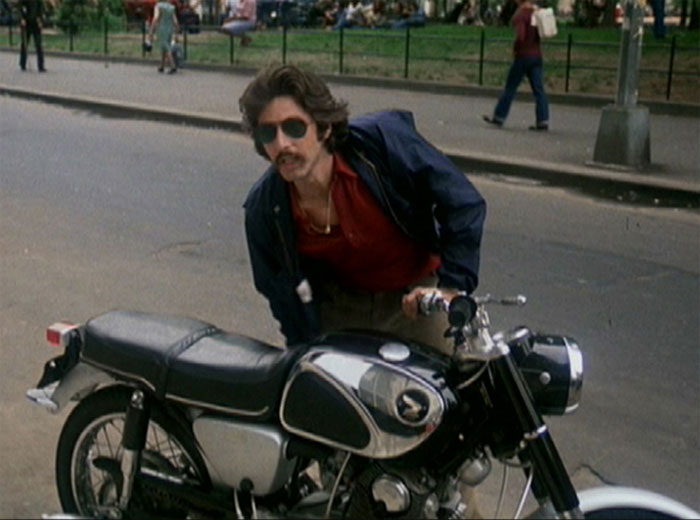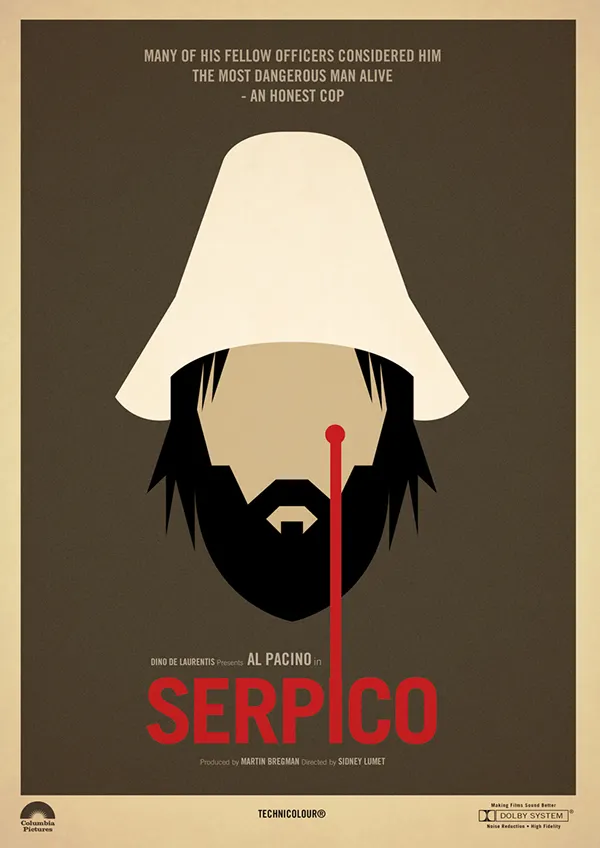Look at that dude.
Pacino, clean-shaven and short-haired as the movie begins, sports the best ‘stache of the decade, then goes goatee, then gets full facial (hair and head), all of which accomplishes several purposes, concurrently: it denotes time passing, it indicates the all-in embrace of counterculture and defiance this ostracized cop is both acting out and reacting to, and finally it reveals how indelibly –and painfully– the process ages him. Mostly, on simple aesthetic levels, Pacino on screen here is as badass as any icon could ever be. That’s my story and I’m sticking to it.
I want—and need—to revisit this movie on an annual basis, because it satisfies many needs. One, it’s a masterpiece, so there’s that. Two, it reminds me many things I need to know, about the world and myself. And most of all, it is a rallying cry against conformity and cowardice; it is a stark reminder of how much we are capable of and how little we typically do. I watch it and think: I want to be that guy. I know I can’t be that guy, so it’s the least I can do to watch, learn and emulate.
I wrote about Serpico while introducing a piece commemorating the ten-year anniversary (in 2009) of what I consider the best film of the last twenty years, The Insider:
(Toward the end of Sydney Lumet’s ’70s classic Serpico there is an unnerving scene that encapsulates the conundrum faced by the eponymous cop: already persona non grata within the law enforcement fraternity for his refusal to take bribes, Serpico is transferred to the narcotics division, where the beat is the exceedingly dangerous streets way off-Broadway. His new partner grimly explains that, compared to the types of kickbacks Serpico was accustomed to seeing, the haul in narcotics is serious business. “That is big money, that you do not fuck around with.” In this moment Serpico finally understands that his life is now in greater danger, amongst police officers than at the hands of criminals, because of his insistence on obeying the law.)
I think this one scene, perhaps even more than anything in the embarrassment of riches that is Network, tells us all we need to know about how the world really works. Going back to the Watergate story, the reporters were advised to “follow the money”. That might be the most disturbingly succinct epitaph of our last century. Every act of violence and venality is prompted by the pursuit of money or the lack thereof, and most of all, the things money can’t buy (which, come to think of it, is the central theme of Before The Devil Knows You’re Dead).
When I ask myself: how is it possible that, despite the will of the people and the painfully obvious cookie crumbs leading to the criminals, Obama has let Wall Street off without so much as a harsh word, or how the Republicans can hold the country hostage for indefinite tax cuts on the wealthiest one percent, or (worse) how so many feckless and supine Democrats can tolerate –and in some cases, abet– this mendacity, or how our military budget is sacrosanct, or how we can continue to fight ill-advised and unwinnable wars (killing countless Americans and “foreigners” in the bargain), when I look at some of my well-educated and otherwise enlightened friends and wonder how they can possibly be immune to this cognitive dissonance, I think of these words: “That is big money, that you do not fuck around with.”
I’d like to revisit a piece I wrote many moons ago (earnestness trumping ability), celebrating Serpico. I could never (and would never) pick favorites but if I had to, I would probably suggest that this movie represented the best work that Pacino and Lumet ever did.
Serpico (1973)
An illuminating moment occurs near the beginning of the film Saturday Night Fever—the project that officially launched the trajectory of John Travolta’s career, where, with a haircut and white suit, the young hot shot evolved from Vinny Barbarino, Sweat Hog, to Tony Manero, disco icon—a film which, like any formidable piece of art, is as much a reflection of its times as it is the vision of its creator: A lean, mean, and bikini brief-clad Travolta halts in mid-strut and gazes lovingly up at his wall, upon which is a poster of the man—a bearded, long-haired, gold hoop earring-wearing undercover cop—and he haughtily, if speciously assures himself “I look like Al Pacino!” The symbolic import of this simple scene is substantial. The act of conferring coolness through establishing, by any means necessary, solidarity with Pacino—particularly a young cat who knows he’s bad, especially a movie character depicting a young cat who knows he’s bad—is about as ringing an endorsement of unequivocal hipness as anyone could reasonably hope to attain. This moment then, signified a passing-of-the-torch of sorts, and an informal promulgation of what most folks already knew: that Al Pacino, in short, is the ‘70’s, and along with Nicholson and DeNiro, formed the divine triumvirate of American motion-picture ascendency in that decade.
Coming less than a year after the searing intensity of his performance as Michael Corleone—in the role and movie, The Godfather, Pacino could not have chosen a more diametric project than the true story of Frank Serpico, the undercover cop who pits himself in a lonely—and costly—war against an entire police force. This film serves as a radical (and realistic) rewriting of the classic—and antiquated—American Dream myth, wherein the best man always wins, and good always prevails over evil. With an escalating irony that could only be culled from real life (otherwise it would be offensively implausible), the more he attempts to distance himself from the wrongdoing around him—which has casually corroded the department like a malignant infirmity—the more scorn he is subjected to. In a word, it doesn’t get any more American than this: Serpico, the man, and Serpico, the movie, are potent amalgams of, and commentaries upon, the country that made them. The idealizing, even naïve young man confronting corruption is arguably an invariable rite of passage for just about every individual who leaves the comforts—and conformity—of home for the bigger, badder realities of the world. When the individual is a police officer, and the subject of his disillusionment is the laissez-faire depravity of his precinct—and, to a larger extent, the backbiting, political system as a whole—the stakes are raised rather considerably.
It is sufficient testament of a job well done that it is impossible to imagine any other actor taking on the role of Frank Serpico and delivering such a capable, compelling performance. The tribulations of this alienated underdog provide the opportunity for Pacino to utilize a concentrated fervor in ways he never would (or could) again. It is a tailor-made vehicle for his expressive gifts: this is his superlative performance, his greatest role. He is, in turns, quiet, assertive, tranquil, indignant and incensed. He is a man of intelligence and integrity surrounded by the numbed and indifferent denizens of New York City’s police departments, amongst whom he wears out his welcome quickly—and irretrievably.
The crux of his dilemma is an unflinching nonconformity, which obliges the battle-wearied veterans of his precinct to examine not only their own detached compliance, but why he won’t go along with it. In a development that is perverse as it is ironic, he becomes increasingly regarded with suspicion because he refuses to break the very laws he’s sworn (and is paid) to uphold. Because he is honest, he cannot be trusted. If the story, or the actor, wasn’t up to the task, this rather unremarkable—indeed scarcely believable—story would seem trite, redundant, or nauseatingly bathetic. Thankfully, this true tale—which, like any worthwhile biography about an extraordinary individual, serves equally as a commentary on society and that evasive and evanescent perception dubbed the human condition—is abundantly provocative, discomforting, and ultimately redeeming.
Serpico is one of the rare and wondrous works of art that truly satisfies on all levels: it is, first and foremost, an intriguing and indelible movie experience. It is also an inspirational story that serves to remind us that crime often operates in an unremarkable, but eviscerating fashion. It reminds us that heroes don’t wear capes, and seldom wear badges. Often, they wear a look of defiance, and a battered, but not beaten pride—a weary, but unwavering integrity.
Serpico was—and will remain—one of the great things that came out of the much-maligned “me-decade”. The bell-bottoms, platform shoes, white suits, pompadours and carefully cultivated obtuseness faded, like the fads that they were. Disco faded; Travolta faded. Just because the cyclical engine of fashion has made some of these things unconscionably, and inconceivably cool again, doesn’t mean that they won’t once again drift back into the droll depths whence they sprang. The stuff of substance, soulful as it is scarce, will nevertheless continue to stick around—as it always does—especially on the fleet and unfashionable frequencies. And, despite The Godfather, despite Dog Day Afternoon, despite Scarface, despite Glengary Glen Ross and Heat—Pacino would never be this cool again. Just ask Tony Manero.


